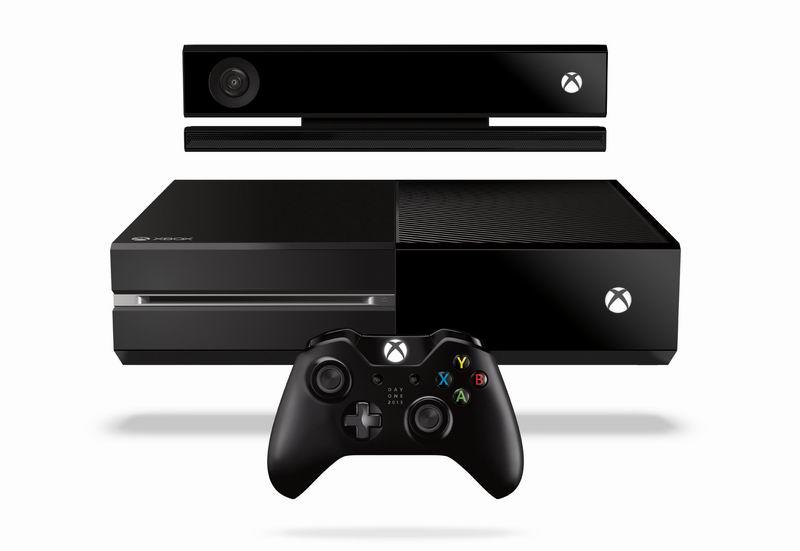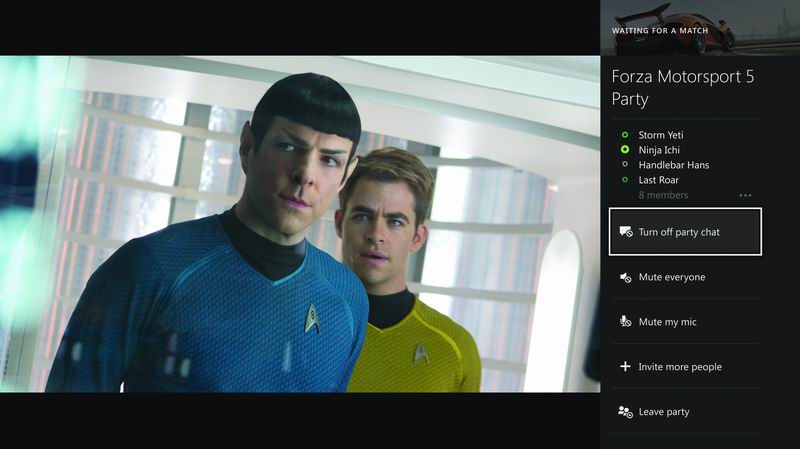Microsoft Xbox One | reviews, news & interviews
Microsoft Xbox One
Microsoft Xbox One
The opening shot in the next generation battle for dominance of your TV

Today sees the first of the truly "next generation" consoles launch – the Microsoft Xbox One. It promises to revolutionise gaming. But in fact, it could well be the last gasp of a dying form of interactive idiocy.
The Xbox One is perhaps the most intriguing of the new console launches – it does something totally different in controlling your entire TV. Aiming to be a one-box multimedia solution, the Xbox One will control your TV viewing, using the built-in Kinect motion-sensing and voice control (this service doesn't come to Europe until 2014!). So plug in the new console and you can play games in one portion of the screen while watching TV in another, you can control your set-top box or change channels with your voice. All your other telly-connected kit is rendered subservient.
 The technology is amazing, but largely pointless. There's the rush of controlling gadgets with your voice that smartphone users may have experienced, then rapidly the return to using the remote. For Americans whose cable connections are infamously complex, this may be great, for Europeans it's certainly not worth the entrance price of the box alone (from £429).
The technology is amazing, but largely pointless. There's the rush of controlling gadgets with your voice that smartphone users may have experienced, then rapidly the return to using the remote. For Americans whose cable connections are infamously complex, this may be great, for Europeans it's certainly not worth the entrance price of the box alone (from £429).
The same technology – motion-sensing and voice control – is usable by games. And it's far more accurate than before. But it's worth remembering that very few games, from very few genres, have ever successfully persuaded gamers that waving their arms and shouting at their TV is a good idea.
Little surprise then that the technology is sparsely used in the launch games – a pedestrian collection simply 20 percent shinier than the last generation of dull games.
Yes, the cars in Forza Motorsport 5 look stunning, but only a bit more stunning than they looked in Forza 4. And yes, it's nice that rival racers in single-player games are now real people – their laps chosen to match your skill and streamed into your game – but the end result still feels like fairly well-balanced and predictable racing (that may change as more racers are uploaded by real players, rather than beta testers).
 Beyond the flagship game, there's worse. Ryse: Son Of Rome is bloody but brutally boring action. Dead Rising 3 scrappy zombie fighting that at least is fun. Nothing looks, let alone plays like anything new.
Beyond the flagship game, there's worse. Ryse: Son Of Rome is bloody but brutally boring action. Dead Rising 3 scrappy zombie fighting that at least is fun. Nothing looks, let alone plays like anything new.
That's the real problem here – a collective failure of nerve among console games makers. Traditional consoles preside over a shrinking and divided kingdom – they're fighting for scraps while their empire has deserted them.
Gamers have increasingly embraced the high-concept, simple-graphics approach of games on smartphones, tablets and innovative and unusual "indie" titles on digital PC services like Steam. The real "next generation" starts when tablet games come seamlessly to your TV, or the Steambox launches, when emotion and story and character intelligence are foregrounded over graphic flare.
What's here will appeal to a laddish "hardcore" of gamers. But that's a shrinking percentage of the population. The real innovation, it seems likely, lies elsewhere.
For the cost, there's certainly little to recommend the Xbox One so far. But who knows what tomorrow holds? Titanfall, the over-the-top walking tank shooter from the people who created Call Of Duty, is an Xbox One exclusive – while it's hardly radical in approach, its execution looks stunning. That may yet prove to be Xbox One's saviour, as could some other as-yet-unannounced title.
The future of Arts Journalism
You can stop theartsdesk.com closing!
We urgently need financing to survive. Our fundraising drive has thus far raised £49,000 but we need to reach £100,000 or we will be forced to close. Please contribute here: https://gofund.me/c3f6033d
And if you can forward this information to anyone who might assist, we’d be grateful.

Subscribe to theartsdesk.com
Thank you for continuing to read our work on theartsdesk.com. For unlimited access to every article in its entirety, including our archive of more than 15,000 pieces, we're asking for £5 per month or £40 per year. We feel it's a very good deal, and hope you do too.
To take a subscription now simply click here.
And if you're looking for that extra gift for a friend or family member, why not treat them to a theartsdesk.com gift subscription?
more Gaming
 'We are bowled over!' Thank you for your messages of love and support
Much-appreciated words of commendation from readers and the cultural community
'We are bowled over!' Thank you for your messages of love and support
Much-appreciated words of commendation from readers and the cultural community
 Kelly Clancy: Playing with Reality - How Games Shape Our World review - how far games go back
The acclaimed neuroscientist on the world and history of games, in all their variety
Kelly Clancy: Playing with Reality - How Games Shape Our World review - how far games go back
The acclaimed neuroscientist on the world and history of games, in all their variety
 Rage 2 review – garish but great post-apocalyptic shooter
Challenge The Authority in this 'Mad Max on mushrooms' renegade romp
Rage 2 review – garish but great post-apocalyptic shooter
Challenge The Authority in this 'Mad Max on mushrooms' renegade romp
 World War Z review - bloodthirsty fun with the zombie apocalypse
Chainsawing the brain-eaters as you battle against the tide of the undead
World War Z review - bloodthirsty fun with the zombie apocalypse
Chainsawing the brain-eaters as you battle against the tide of the undead
 The Lego Movie 2 Videogame review - everything is not awesome
Few fresh ideas means this movie adaptation treads the same old ground
The Lego Movie 2 Videogame review - everything is not awesome
Few fresh ideas means this movie adaptation treads the same old ground
 Anthem review - singing praises? More like a cautious nod
A rocky start for a new franchise that offers potential and problems in equal measure
Anthem review - singing praises? More like a cautious nod
A rocky start for a new franchise that offers potential and problems in equal measure
 Crackdown 3 review - spectacular super-powered action that was great fun many years ago
Nearly a decade has passed since the last incarnation but little has changed in this stagnant shooter
Crackdown 3 review - spectacular super-powered action that was great fun many years ago
Nearly a decade has passed since the last incarnation but little has changed in this stagnant shooter
 Battlefield V review - WWII on an epic scale
The veteran series returns for another ambitious tour of duty
Battlefield V review - WWII on an epic scale
The veteran series returns for another ambitious tour of duty
 Fallout 76 review - how to wreck a perfectly good legacy with one messy game
When home runs go horribly wrong
Fallout 76 review - how to wreck a perfectly good legacy with one messy game
When home runs go horribly wrong
 Red Dead Redemption 2 review - the cowboy drama makes a triumphant return
An ambitious Wild West odyssey that matches epic scale with benchmark skill
Red Dead Redemption 2 review - the cowboy drama makes a triumphant return
An ambitious Wild West odyssey that matches epic scale with benchmark skill
 Call of Duty: Black Ops 4 review – less is more
Solo rations have been relegated from this benchmark war series
Call of Duty: Black Ops 4 review – less is more
Solo rations have been relegated from this benchmark war series
 FIFA 19 review - the best just got a bit better
It looks and plays great, but what’s new?
FIFA 19 review - the best just got a bit better
It looks and plays great, but what’s new?

Add comment